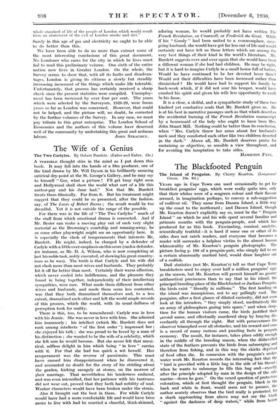The Wife of a Genius
The Two Carlyles. By Osbert Burdett. (Faber and Faber. 15s.) A TicansBLs: thought stirs in the mind as I put down this book. It may fall into the hands of a film producer, one of the kind drawn by Mr. Will Dyson in his brilliantly amusing satirical dry-point at the St. George's Gallery, and he may say to himself " Gee, what a picture ! I'll get busy right soon and Hollywood shall show the world what sort of a life this author-guy and his Jane had." Not that Mr. Burdett treats them filmically. Far from it. But his treatment might suggest that they could be so presented, after the fashion, say, of The Loves of Robert Burns ; the result would be too dreadful. Yet it is not outside the range of the possible.
For there was in the life of " The Two Carlyles " much of the stuff from which emotional drama is concocted. And if Mr. Besier can make a moving play out of such very slight material as the Browning's courtship and running-away, he or some other playwright might see an opportunity here. It is especially the clash of temperaments that interests Mr, Burdett. He might, indeed, be charged by a defender of Carlyle with a little over-emphasis on this score (such a defender. for instance, as Mr. D. A. Wilson, who is now completing at last his noble task, nobly executed, of showing his great country- man as he was). The truth is that Carlyle and his wife did not clash more than most wives and husbands. They probably hit it off far better than most. Certainly their warm affection, which never cooled into indifference, and the pleasure they found in being together, independently of their intellectual sympathies, were rare. What made them different from other wives and husbands, and made them seem less contented, was that they both dramatized themselves and, to a less extent, dramatized each other and left the world ample records of this process, which the world, with its usual dullness of perception took for reality.
There is this, too, to be remembered: Carlyle was in love with his Jeanie. She was never in love with him. She admired him immensely ; his intellect (which Mr. Burdett does not rank among intellects " of the first order ") impressed her ; she enjoyed his talk ; she was proud to be loved by a man of his distinction ; she wanted to be the wife of a celebrity, which she felt sure he would become. But she never felt that uncri- tical, selfless delight in him which being " in love " carries with it. For that she had too quick a wit herself. Her temperament was the reverse of passionate. This must have caused him disappointment when he discovered it, and accounted no doubt for the story of his striding about the garden, kicking savagely at stones, on the morrow of their marriage. That nevertheless his tenderness endured, and was even intensified, that her patience with his tantrums did not wear out, proved that they both had nobility of soul. Weaker characters would have been broken under the strain.
Also it brought out the best in them. For while Carlyle would have had a more comfortable life and would have been easier to live with had he married a cheerful, thick-skinned,
adoring woman, he would probably not have written The French Revolution, or Cromwell, or Frederick the Great. While if his " Goody " had been united to a commonplace, easy- ioing husbind, she would have got far less out of life and would certainly not have left us those letters which arc among the very best things of their kind in the world's literature. Mr. Burdett suggests over and over again that she would have been a different woman if she had had children. He may be right, but it is hard to imagine Carlyle in a small house full of babies. Would he have continued to be her devoted lover then ? Would not their difficulties have been increased rather than diminished ? He would have had to support his family by hack-work which, if it did not sour his temper, would have crushed his spirit and given his wife less opportunity to exult in his fame.
It is a close, a skilful, and a sympathetic study of these two kindred yet combative souls that Mr. Burdett gives us. Ile is at his best in narrative passages such as that which describes the accidental burning of the French Revolution manuscript by a housemaid of the lady who ought to have been Mrs. John Stuart Mill. Nothing could be better than its conclusion, when " Mrs. Carlyle threw her arms about her husband's neck and they comforted each other like two children deserted in the dark." Above all, Mr. Burdett deserves praise for sustaining so objective, so sensible a view throughout, and for avoiding the temptation to take sides.
HAMILTON FYFE.


























































 Previous page
Previous page